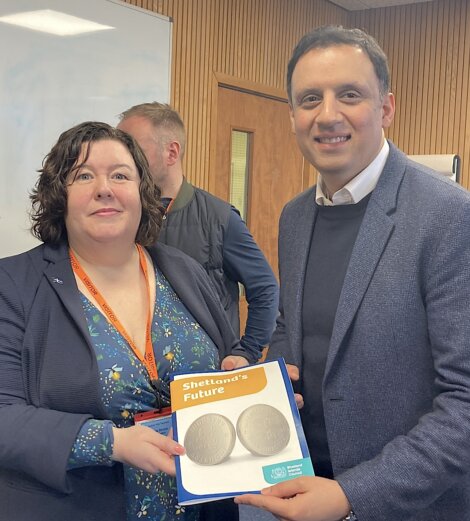Energy / Route to net zero goes through oil and gas, Labour leader hears on visit north
Anas Sarwar is told of the challenges of the clean energy transition during a visit to Sullom Voe Terminal
SULLOM Voe Terminal operator EnQuest has painted a stark picture of the oil and gas industry and the obstacles it faces to turn the facility into a centre for energy transition.
On Friday the company hosted a day of presentations and workshops with Scottish Labour leader Anas Sarwar and the general secretary of the GMB union, Gary Smith, to get the message across that the clean energy transition might not happen unless governments come on board as a reliable partner.
Present were also several senior company managers, council leader Emma Macdonald, SIC chief executive Maggie Sandison, isles MP Alistair Carmichael and, for parts of the day at least, a number of local journalists.
EnQuest chief executive Amjad Bseisu said throughput at Sullom Voe has declined from 1.4 million barrels a day to just 100,000 barrels, a fraction of what was processed at the terminal in its heyday.
Photo: Hans J Marter/Shetland News
As more and more major oil companies leave the North Sea oil and gas production continues to decline, making any new investment in the sector “high risk” he said.
The industry, and Sullom Voe Terminal, was now at a “cliff edge”, Bseisu added.
He said that without a guaranteed throughput of oil and gas well into the future, it would be impossible to finance the decarbonisation and clean energy transition at the terminal.
Meanwhile, new energy projects such as carbon capture and storage (CCS), wind energy and hydrogen production are only at a very early stage.
Bseisu revealed the company had already lost two of the partners that had initially signed up to EnQuest’s hydrogen plans, because they felt they were too far in the future.
Become a member of Shetland News
Addressing Sarwar, he welcomed the Labour Government’s consultation on ending the energy profits levy by 2030 but added that incentives to invest in the clean energy future were needed now.
Smith meanwhile said people employed in the industry were watching the oil and gas infrastructure closing down because “there is little left to extract”, and warned that the critical mass needed to run the industry was being lost.
Those challenges which had been “chronic for a long time but now have become acute”, MP Carmichael said, are particularly relevant in Shetland where around 1,000 well paid jobs are supported by the oil and gas industry.
Sullom Voe Terminal was described as a “microcosm” where all these challenges could play out, with potentially negative consequences for the isles.
SIC chief Sandison told Sarwar and Smith that the scale of Shetland’s contribution to the economy of Scotland and the UK was poorly understood, and rarely appreciated by politicians in Edinburgh and Westminster.
She said the islands were ready to work in partnership with both governments to alleviate some of the inequalities that exist, such as high energy prices, limited digital connectivity and the lack of sufficient investment in transport infrastructure.
Referring to the local supply chain, she added: “We need to keep those capabilities here, and for that we need a partnership between the council and both governments.”
Both Sarwar and Smith were surprised to hear that – so far – local residents were not benefitting from the Viking wind farm in the form of lower electricity prices.
Speaking after the meeting, Sarwar told Shetland News: “What the conversation demonstrated is that there are, of course, challenges but there are also huge opportunities.
“Listening to the council leader and chief executive of the council as well as to Amjad and the team at EnQuest demonstrates that there is an appetite (…) to develop and to expand and see that just transition delivered.
“They want to see this done in a way that protects the local community, attracts investment, creates jobs and improves living standards and, fundamentally, I think that is the only approach that is going to work.
“That requires partnership working between industry, local authority, the UK Government and the Scottish Government.”
Become a member of Shetland News
Shetland News is asking its readers to consider paying for membership to get additional perks:
- Removal of third-party ads;
- Bookmark posts to read later;
- Exclusive curated weekly newsletter;
- Hide membership messages;
- Comments open for discussion.
If you appreciate what we do and feel strongly about impartial local journalism, then please become a member of Shetland News by either making a single payment, or setting up a monthly, quarterly or yearly subscription.





























































